Unit 3 How do you get to school? Section B 3a-self-check课件34张2021-2022学年人教版英语七年级下册
文档属性
| 名称 | Unit 3 How do you get to school? Section B 3a-self-check课件34张2021-2022学年人教版英语七年级下册 |  | |
| 格式 | zip | ||
| 文件大小 | 4.4MB | ||
| 资源类型 | 教案 | ||
| 版本资源 | 人教新目标(Go for it)版 | ||
| 科目 | 英语 | ||
| 更新时间 | 2022-03-09 20:18:41 | ||
图片预览

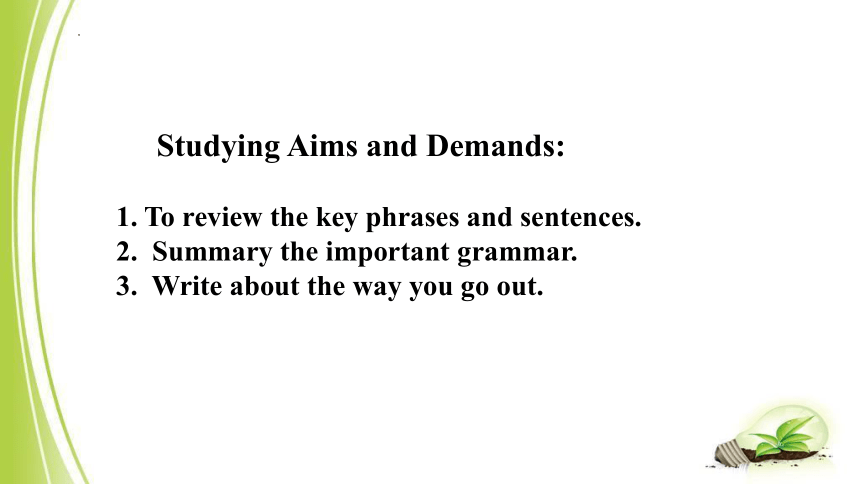
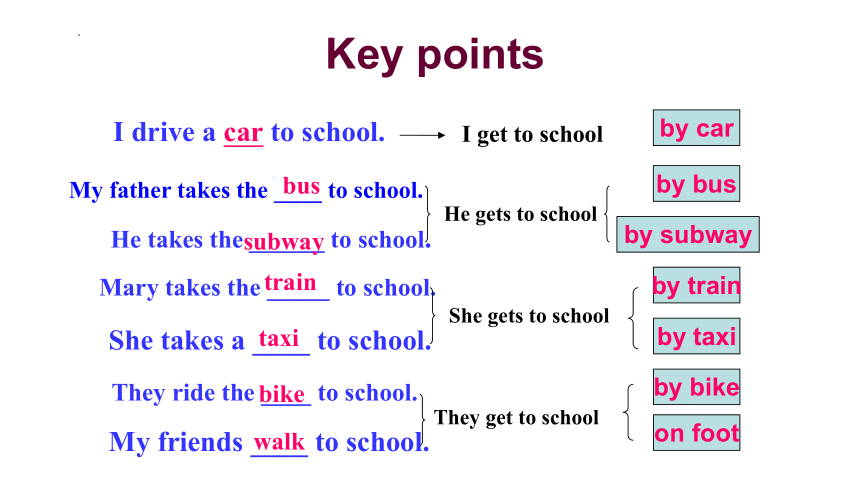
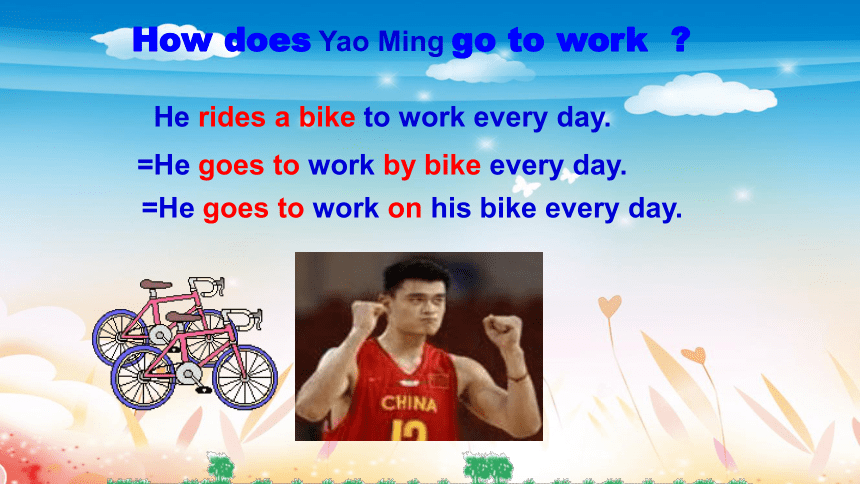
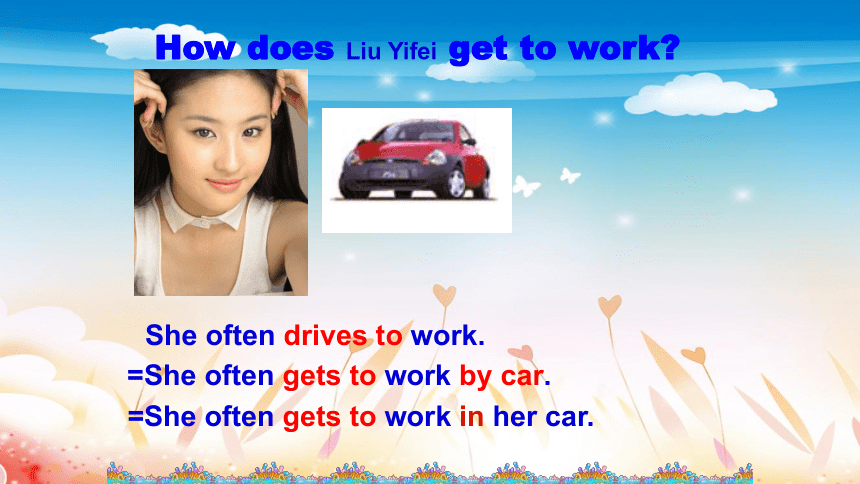
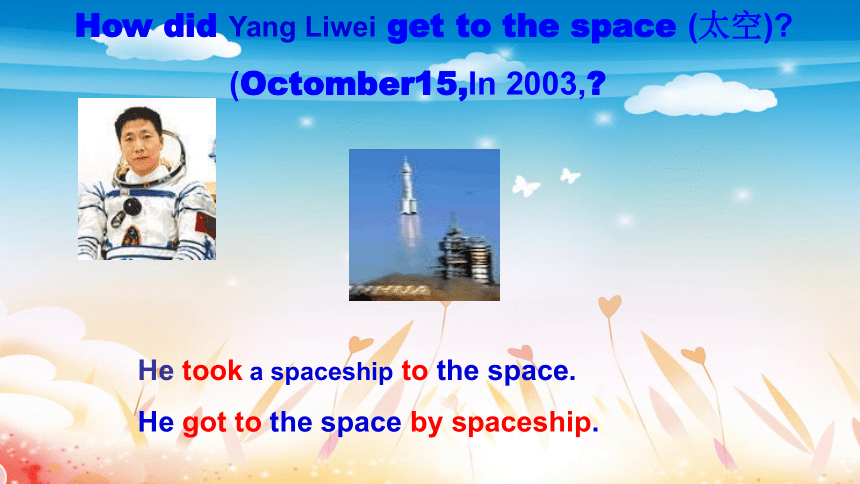
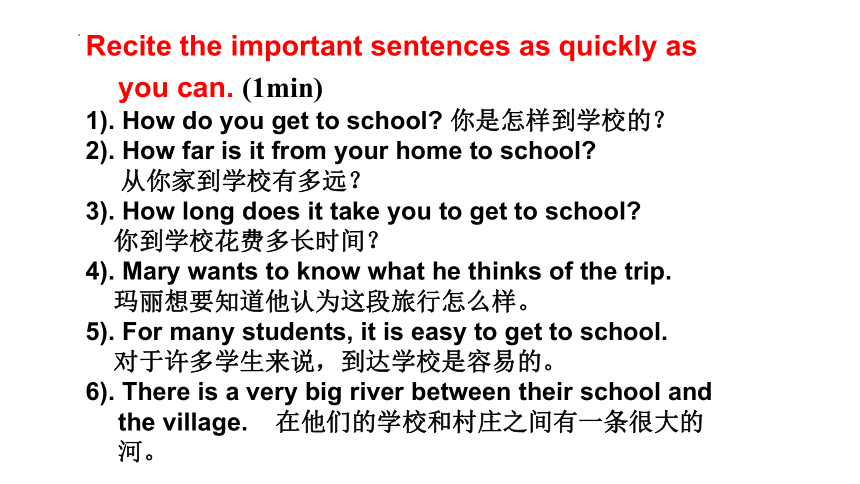
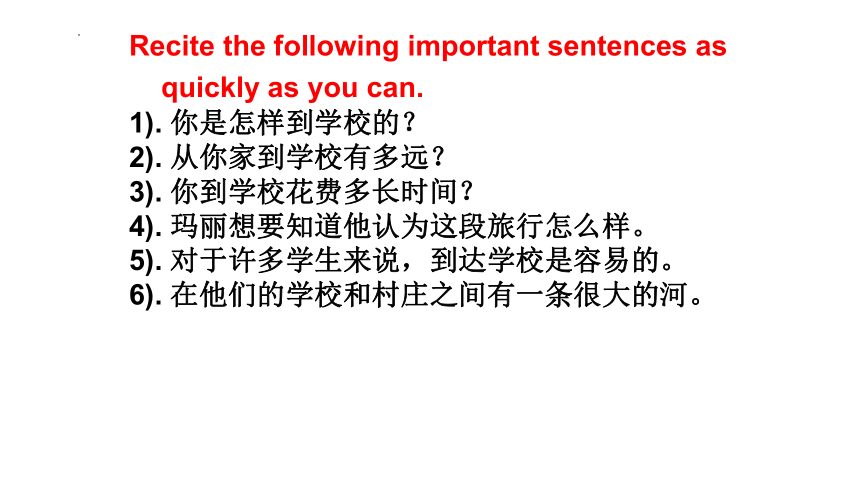
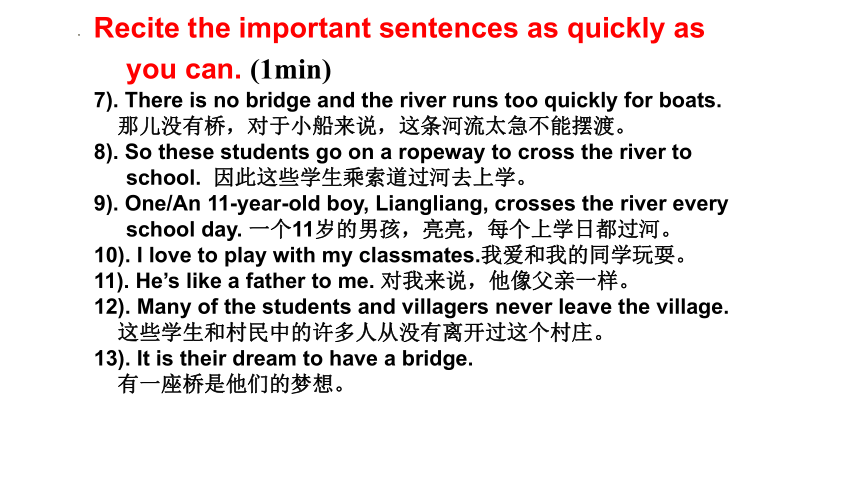
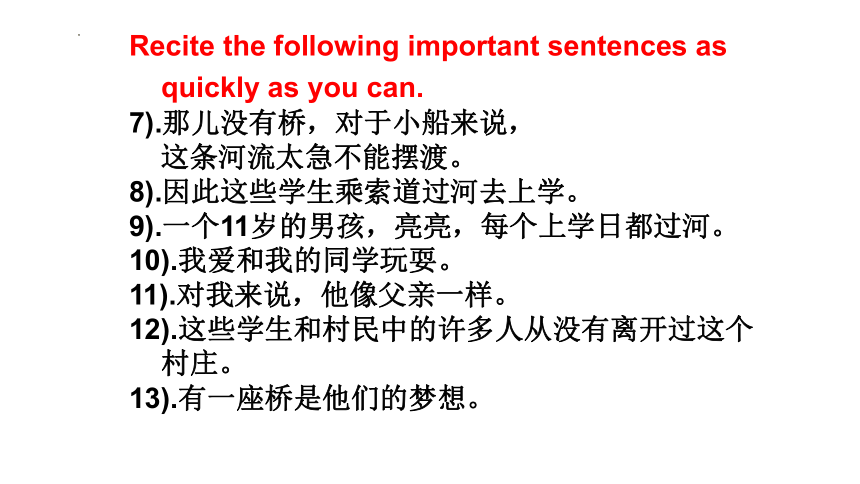

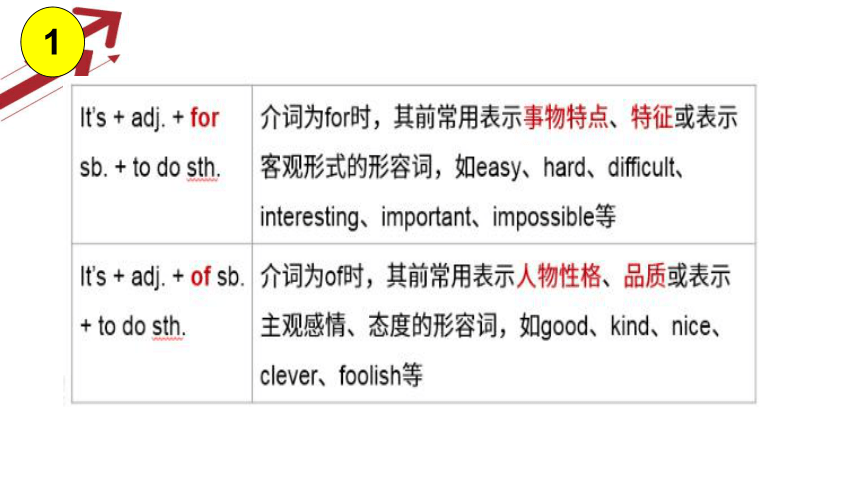
文档简介
(共34张PPT)
How do you get to school
Unit 3
Section B-3
Welcome to our class
Studying Aims and Demands:
1. To review the key phrases and sentences.
2. Summary the important grammar.
3. Write about the way you go out.
I drive a car to school.
Key points
Mary takes the _____ to school.
My father takes the ____ to school.
He takes the ______ to school.
She takes a ____ to school.
They ride the ____ to school.
My friends ____ to school.
bus
train
subway
walk
bike
taxi
I get to school
by bus
by train
by car
by subway
by taxi
by bike
on foot
He gets to school
She gets to school
They get to school
How does Yao Ming go to work
=He goes to work by bike every day.
He rides a bike to work every day.
=He goes to work on his bike every day.
=She often gets to work by car.
How does Liu Yifei get to work
=She often gets to work in her car.
She often drives to work.
How did Yang Liwei get to the space (太空)
(Octomber15,In 2003,
He took a spaceship to the space.
He got to the space by spaceship.
Recite the important sentences as quickly as you can. (1min)
1). How do you get to school 你是怎样到学校的?
2). How far is it from your home to school
从你家到学校有多远?
3). How long does it take you to get to school
你到学校花费多长时间?
4). Mary wants to know what he thinks of the trip.
玛丽想要知道他认为这段旅行怎么样。
5). For many students, it is easy to get to school.
对于许多学生来说,到达学校是容易的。
6). There is a very big river between their school and the village. 在他们的学校和村庄之间有一条很大的河。
Recite the following important sentences as quickly as you can.
1). 你是怎样到学校的?
2). 从你家到学校有多远?
3). 你到学校花费多长时间?
4). 玛丽想要知道他认为这段旅行怎么样。
5). 对于许多学生来说,到达学校是容易的。
6). 在他们的学校和村庄之间有一条很大的河。
Recite the important sentences as quickly as you can. (1min)
7). There is no bridge and the river runs too quickly for boats.
那儿没有桥,对于小船来说,这条河流太急不能摆渡。
8). So these students go on a ropeway to cross the river to school. 因此这些学生乘索道过河去上学。
9). One/An 11-year-old boy, Liangliang, crosses the river every school day. 一个11岁的男孩,亮亮,每个上学日都过河。
10). I love to play with my classmates.我爱和我的同学玩耍。
11). He’s like a father to me. 对我来说,他像父亲一样。
12). Many of the students and villagers never leave the village.
这些学生和村民中的许多人从没有离开过这个村庄。
13). It is their dream to have a bridge.
有一座桥是他们的梦想。
Recite the following important sentences as quickly as you can.
7).那儿没有桥,对于小船来说,
这条河流太急不能摆渡。
8).因此这些学生乘索道过河去上学。
9).一个11岁的男孩,亮亮,每个上学日都过河。
10).我爱和我的同学玩耍。
11).对我来说,他像父亲一样。
12).这些学生和村民中的许多人从没有离开过这个村庄。
13).有一座桥是他们的梦想。
Lanauage points
1
It is + adj. +for sb to do sth.(对某人来说)做某事怎么样(It 是形式主语, to do 是真正主语)
.It is + adj. +of sb to do sth(人的性格/品质)
It is very important for us to learn English well.
It is very kind of you to lend me your pen.
This is a fourteen-year-old student.
an 11-year –old boy 一个十一岁的男孩(定语)
He is 11 years old.(表语)
这是一个十四岁的学生_____________________
这个学生十四岁了.____________________
This student is 14 years old.
11-year-old是一个合成形容词,中间的名词只能用单数形式。
2
a four-day trip 一个四天的旅行
a 60-page book 一本60页的书
a three-room house 一个三间屋的房子
But he is not afraid. 但是他不害怕。
afraid adj. 害怕的;畏惧的
be afraid to do sth. 害怕做某事
be afraid of sth. / sb. 怕某事/某人
Eg. I’m afraid of dogs.我害怕狗
I’m afraid to play with dogs.
3
He is like a father to me.
对于我来说,他像一个父亲。
1) like prep. 像
be like像; look like看起来像
The baby is like his mother.
The baby looks like his mother.
这个小婴儿像他妈妈。
2) like v. 喜欢 like to do /doing
My brother likes eating strawberries very much.
我的弟弟非常喜欢吃草莓。
4
Many of the students and villagers never leave the village. 许多学生和村民从未离开过村庄。
1)Many of the/these/one's“….中的许多”
2) leave v. 离开The train will leave . 列车要开了。
“leave for + 地点”表示“动身去某地”
He will leave for Shanghai tomorrow.
“leave+ 地点 + for + 地点”表示“离开某地去某地”
I will leave Shanghai for Beijing.
5
There is a very big river between their school and the village.
1. there be:客观存在的“有”,强调存在的状态
*there be + 主语 (be动词的形式与主语保持一致)
2. have: 主观方面,强调“所属” 关系,表示“拥有,占有,具有” (have与主语保持人称和数的一致)
There are many apples on the tree.
She has a nice schoolbag.
6
1.Where do you live 2.What time do you get up
3.How far is it from your home to school
4.How do you get to school Why
5.How long does it take
6. Are you afraid 7.What’s your dream
Dear editor(编辑),
I need your help. My name is…___________
________________________________________________________________________________________________________________________________________________________
Liangliang
Be a good writer.
Dear Liangliang ,
How are you I’m 12 _____ old . After reading crossing the river to... I know there are ______(许多)differences(区别)_______you and me .I live in the city ,you live in the _______. It’s easy ______me to go to school __ bus .My home is near ,but your home is far from school. It’s ________for you to ____ a ropeway to ____ the river to school. I think I’m ______ to do that. I hope your ______ can come _____ quickly. All of my classmates want to help you . And I think our government (政府)will build a ________ for you soon .(不久)Does your teacher _____with you after class My teacher does. He is ____ my friend ____me ,too. The teachers and the students ____ our school want to buy something for you . Do you need clothes ____ schoolbags Do you like clocks or watches
Bob
课文延伸
years
many
between
village
for
by
difficult
take
cross
dream
true
like
bridge
play
to
in
or
afraid
Help fill in the blanks
kilometers get to takes walk boring leave
3a
Read the e-mail from your pen pal Tom in the US. Fill in the blanks with the words in the box.
Hi there,
How are you Thank you for your last e-mail. You want to know how I ________ school, right Well, I usually ______ my home at about 8:00 and _____ to the bus stop. The school bus usually comes at about 8:15. My school is about 20 _________ from my home. It _______ about 40 minutes to get there by bus. The bus ride is never __________ because I always talk to my classmates.
What about you How do you get to school
Tom
get to
leave
walk
kilometers
takes
boring
Write an e-mail to Tom and tell him how you get to school. These questions may help you.
3b
1. When do you leave home
2. How do you get to school
3. How far is it from your home to school
4. How long does it take you to get to school
5. Do you like your trip to school
谈论出行:
1. 离家时间
2. 到达方式
3.距离
4. 花费时间
5. 评价
When
How
How far
How long
How
介绍出行方式
写作思路点拨
Step Idea Expression
1 问候并感谢对方的邮件 Thank you for your e-mail. Let me tell you how I…
2 具体内容:何时离开家?出行方式?离学校多远? 花费多长时间? leave my home at…, take… to school,
about…kilometers/meters
from my home, take about…hours/
minutes to get there by…
3 结束语:表明自己的看法 I like… because…
How are you Thank you for your last e-mail.(问候并感谢对方的邮件) I know how you get to school. Now let me tell you how I get to school.(引出下文) I usually leave home at half past seven.(离家时间) First, I walk to the subway station. Then I take the subway to school. (到达方式)My school is about ten kilometers from my home. (距离)It usually takes me about half an hour to get to school. (花费时间)I usually meets many friends. So my trip is always interesting .(感受)
One possible version
Dear Tom,
Peter
Use the words in the boxes to form as many expressions as possible.
1
take, walk, ride, drive
bus, train, car, bike, plane, subway, boat
by
Self check
take a bus, by bus,___________________________ _________________________________________________________________________________________________________________________________
drive a car, by car
ride a bike, by bike
take the plane, by plane
take a boat, by boat
take the subway, by subway
walk
take a train, by train
Look at the chart below. And then answer the questions.
2
Who Where How How far How long
Tony from home to school by bike 5 km 20 minutes
Mary from home to the library by bus 15 km 40 minutes
1. How far is it from Tony’ s home to school
_________________________________________________________________
2. How long does it take Tony to get to school by bike
_________________________________________________________________
3. How does Mary get to the library
_________________________________________________________________
4. How far is it from Mary’s home to the library
________________________________________________________________
5. How long does it take Mary to get to the library
_____________________________________________________________
It’s five kilometers.
She gets to the library by bus.
It takes about 20 minutes.
It’s about fifteen kilometers.
It takes about forty minutes.
How does Tony get to school
Tony is my good friend. He lives about seven kilometers from school. He usually gets to school by bike. It usually takes about ten minutes.
report
How does Mary get to the library
She lives about fifteen kilometers from the library. She usually takes the bus to the library. It takes about forty minutes to get to the library.
Mary is my good friend.________________________________ ________________________________________________________________________________________________________
*
Have a good day!
Bye!
课时训练
( )1. — How do you usually go to school
— By _________ bike, but sometimes I take __________ bus.
A. a; / B. a; the C. the; a D. /; a
( )2. — Q comes ______ P and R.— Yes, you’re right.
A. between B. in C. by D. to
( )3. No ________ crosses this long river, so they go on a ropeway.
A. story B. villager C. car D. bridge
( )4. — Can you _____ me home — Sure. Get on!
A. drive B. walk C. leave D. live
( )5. — How much is this black jacket — It’s ___________ yuan.
A. two hundreds and eighty-eight B. two hundred and eighty-eight
C. two hundreds eighty and eight D. two hundred eighty and eight
D
A
B
A
D
1.金先生经常搭飞机去悉尼开会。
Mr .King often goes to Sydney for the meeting .
2.你认为这部电影怎样? do you the film?
3.我的妈妈通常乘火车去上班。
My mother usually goes to work .
4.他的工厂离他的家有多远?
is it from his home to the factory
5.这个12岁女孩走路上学。 The girl to school.
课时训练
by plane
11-year-old walks
by train
How like
How far
课时训练
1. Can you tell me how (get) your home
2 . Look!There are many ________(bus)over there.
3. My uncle is a bus ________(drive).
4. Are you afraid _________(cross)the river on a ropeway
5. It takes me an hour ______(do)my homework every day.
6. Thank you for ______ (tell) me the good news.
8.He feels very tired;he wants to stop (have) a rest.
9.There are two (hundred) teachers in our school.
10.How long does it take you ________(walk)to the bus station.
to get
buses
to have
hundred
to do
driver
to walk
to cross
telling
How do you get to school
Unit 3
Section B-3
Welcome to our class
Studying Aims and Demands:
1. To review the key phrases and sentences.
2. Summary the important grammar.
3. Write about the way you go out.
I drive a car to school.
Key points
Mary takes the _____ to school.
My father takes the ____ to school.
He takes the ______ to school.
She takes a ____ to school.
They ride the ____ to school.
My friends ____ to school.
bus
train
subway
walk
bike
taxi
I get to school
by bus
by train
by car
by subway
by taxi
by bike
on foot
He gets to school
She gets to school
They get to school
How does Yao Ming go to work
=He goes to work by bike every day.
He rides a bike to work every day.
=He goes to work on his bike every day.
=She often gets to work by car.
How does Liu Yifei get to work
=She often gets to work in her car.
She often drives to work.
How did Yang Liwei get to the space (太空)
(Octomber15,In 2003,
He took a spaceship to the space.
He got to the space by spaceship.
Recite the important sentences as quickly as you can. (1min)
1). How do you get to school 你是怎样到学校的?
2). How far is it from your home to school
从你家到学校有多远?
3). How long does it take you to get to school
你到学校花费多长时间?
4). Mary wants to know what he thinks of the trip.
玛丽想要知道他认为这段旅行怎么样。
5). For many students, it is easy to get to school.
对于许多学生来说,到达学校是容易的。
6). There is a very big river between their school and the village. 在他们的学校和村庄之间有一条很大的河。
Recite the following important sentences as quickly as you can.
1). 你是怎样到学校的?
2). 从你家到学校有多远?
3). 你到学校花费多长时间?
4). 玛丽想要知道他认为这段旅行怎么样。
5). 对于许多学生来说,到达学校是容易的。
6). 在他们的学校和村庄之间有一条很大的河。
Recite the important sentences as quickly as you can. (1min)
7). There is no bridge and the river runs too quickly for boats.
那儿没有桥,对于小船来说,这条河流太急不能摆渡。
8). So these students go on a ropeway to cross the river to school. 因此这些学生乘索道过河去上学。
9). One/An 11-year-old boy, Liangliang, crosses the river every school day. 一个11岁的男孩,亮亮,每个上学日都过河。
10). I love to play with my classmates.我爱和我的同学玩耍。
11). He’s like a father to me. 对我来说,他像父亲一样。
12). Many of the students and villagers never leave the village.
这些学生和村民中的许多人从没有离开过这个村庄。
13). It is their dream to have a bridge.
有一座桥是他们的梦想。
Recite the following important sentences as quickly as you can.
7).那儿没有桥,对于小船来说,
这条河流太急不能摆渡。
8).因此这些学生乘索道过河去上学。
9).一个11岁的男孩,亮亮,每个上学日都过河。
10).我爱和我的同学玩耍。
11).对我来说,他像父亲一样。
12).这些学生和村民中的许多人从没有离开过这个村庄。
13).有一座桥是他们的梦想。
Lanauage points
1
It is + adj. +for sb to do sth.(对某人来说)做某事怎么样(It 是形式主语, to do 是真正主语)
.It is + adj. +of sb to do sth(人的性格/品质)
It is very important for us to learn English well.
It is very kind of you to lend me your pen.
This is a fourteen-year-old student.
an 11-year –old boy 一个十一岁的男孩(定语)
He is 11 years old.(表语)
这是一个十四岁的学生_____________________
这个学生十四岁了.____________________
This student is 14 years old.
11-year-old是一个合成形容词,中间的名词只能用单数形式。
2
a four-day trip 一个四天的旅行
a 60-page book 一本60页的书
a three-room house 一个三间屋的房子
But he is not afraid. 但是他不害怕。
afraid adj. 害怕的;畏惧的
be afraid to do sth. 害怕做某事
be afraid of sth. / sb. 怕某事/某人
Eg. I’m afraid of dogs.我害怕狗
I’m afraid to play with dogs.
3
He is like a father to me.
对于我来说,他像一个父亲。
1) like prep. 像
be like像; look like看起来像
The baby is like his mother.
The baby looks like his mother.
这个小婴儿像他妈妈。
2) like v. 喜欢 like to do /doing
My brother likes eating strawberries very much.
我的弟弟非常喜欢吃草莓。
4
Many of the students and villagers never leave the village. 许多学生和村民从未离开过村庄。
1)Many of the/these/one's“….中的许多”
2) leave v. 离开The train will leave . 列车要开了。
“leave for + 地点”表示“动身去某地”
He will leave for Shanghai tomorrow.
“leave+ 地点 + for + 地点”表示“离开某地去某地”
I will leave Shanghai for Beijing.
5
There is a very big river between their school and the village.
1. there be:客观存在的“有”,强调存在的状态
*there be + 主语 (be动词的形式与主语保持一致)
2. have: 主观方面,强调“所属” 关系,表示“拥有,占有,具有” (have与主语保持人称和数的一致)
There are many apples on the tree.
She has a nice schoolbag.
6
1.Where do you live 2.What time do you get up
3.How far is it from your home to school
4.How do you get to school Why
5.How long does it take
6. Are you afraid 7.What’s your dream
Dear editor(编辑),
I need your help. My name is…___________
________________________________________________________________________________________________________________________________________________________
Liangliang
Be a good writer.
Dear Liangliang ,
How are you I’m 12 _____ old . After reading crossing the river to... I know there are ______(许多)differences(区别)_______you and me .I live in the city ,you live in the _______. It’s easy ______me to go to school __ bus .My home is near ,but your home is far from school. It’s ________for you to ____ a ropeway to ____ the river to school. I think I’m ______ to do that. I hope your ______ can come _____ quickly. All of my classmates want to help you . And I think our government (政府)will build a ________ for you soon .(不久)Does your teacher _____with you after class My teacher does. He is ____ my friend ____me ,too. The teachers and the students ____ our school want to buy something for you . Do you need clothes ____ schoolbags Do you like clocks or watches
Bob
课文延伸
years
many
between
village
for
by
difficult
take
cross
dream
true
like
bridge
play
to
in
or
afraid
Help fill in the blanks
kilometers get to takes walk boring leave
3a
Read the e-mail from your pen pal Tom in the US. Fill in the blanks with the words in the box.
Hi there,
How are you Thank you for your last e-mail. You want to know how I ________ school, right Well, I usually ______ my home at about 8:00 and _____ to the bus stop. The school bus usually comes at about 8:15. My school is about 20 _________ from my home. It _______ about 40 minutes to get there by bus. The bus ride is never __________ because I always talk to my classmates.
What about you How do you get to school
Tom
get to
leave
walk
kilometers
takes
boring
Write an e-mail to Tom and tell him how you get to school. These questions may help you.
3b
1. When do you leave home
2. How do you get to school
3. How far is it from your home to school
4. How long does it take you to get to school
5. Do you like your trip to school
谈论出行:
1. 离家时间
2. 到达方式
3.距离
4. 花费时间
5. 评价
When
How
How far
How long
How
介绍出行方式
写作思路点拨
Step Idea Expression
1 问候并感谢对方的邮件 Thank you for your e-mail. Let me tell you how I…
2 具体内容:何时离开家?出行方式?离学校多远? 花费多长时间? leave my home at…, take… to school,
about…kilometers/meters
from my home, take about…hours/
minutes to get there by…
3 结束语:表明自己的看法 I like… because…
How are you Thank you for your last e-mail.(问候并感谢对方的邮件) I know how you get to school. Now let me tell you how I get to school.(引出下文) I usually leave home at half past seven.(离家时间) First, I walk to the subway station. Then I take the subway to school. (到达方式)My school is about ten kilometers from my home. (距离)It usually takes me about half an hour to get to school. (花费时间)I usually meets many friends. So my trip is always interesting .(感受)
One possible version
Dear Tom,
Peter
Use the words in the boxes to form as many expressions as possible.
1
take, walk, ride, drive
bus, train, car, bike, plane, subway, boat
by
Self check
take a bus, by bus,___________________________ _________________________________________________________________________________________________________________________________
drive a car, by car
ride a bike, by bike
take the plane, by plane
take a boat, by boat
take the subway, by subway
walk
take a train, by train
Look at the chart below. And then answer the questions.
2
Who Where How How far How long
Tony from home to school by bike 5 km 20 minutes
Mary from home to the library by bus 15 km 40 minutes
1. How far is it from Tony’ s home to school
_________________________________________________________________
2. How long does it take Tony to get to school by bike
_________________________________________________________________
3. How does Mary get to the library
_________________________________________________________________
4. How far is it from Mary’s home to the library
________________________________________________________________
5. How long does it take Mary to get to the library
_____________________________________________________________
It’s five kilometers.
She gets to the library by bus.
It takes about 20 minutes.
It’s about fifteen kilometers.
It takes about forty minutes.
How does Tony get to school
Tony is my good friend. He lives about seven kilometers from school. He usually gets to school by bike. It usually takes about ten minutes.
report
How does Mary get to the library
She lives about fifteen kilometers from the library. She usually takes the bus to the library. It takes about forty minutes to get to the library.
Mary is my good friend.________________________________ ________________________________________________________________________________________________________
*
Have a good day!
Bye!
课时训练
( )1. — How do you usually go to school
— By _________ bike, but sometimes I take __________ bus.
A. a; / B. a; the C. the; a D. /; a
( )2. — Q comes ______ P and R.— Yes, you’re right.
A. between B. in C. by D. to
( )3. No ________ crosses this long river, so they go on a ropeway.
A. story B. villager C. car D. bridge
( )4. — Can you _____ me home — Sure. Get on!
A. drive B. walk C. leave D. live
( )5. — How much is this black jacket — It’s ___________ yuan.
A. two hundreds and eighty-eight B. two hundred and eighty-eight
C. two hundreds eighty and eight D. two hundred eighty and eight
D
A
B
A
D
1.金先生经常搭飞机去悉尼开会。
Mr .King often goes to Sydney for the meeting .
2.你认为这部电影怎样? do you the film?
3.我的妈妈通常乘火车去上班。
My mother usually goes to work .
4.他的工厂离他的家有多远?
is it from his home to the factory
5.这个12岁女孩走路上学。 The girl to school.
课时训练
by plane
11-year-old walks
by train
How like
How far
课时训练
1. Can you tell me how (get) your home
2 . Look!There are many ________(bus)over there.
3. My uncle is a bus ________(drive).
4. Are you afraid _________(cross)the river on a ropeway
5. It takes me an hour ______(do)my homework every day.
6. Thank you for ______ (tell) me the good news.
8.He feels very tired;he wants to stop (have) a rest.
9.There are two (hundred) teachers in our school.
10.How long does it take you ________(walk)to the bus station.
to get
buses
to have
hundred
to do
driver
to walk
to cross
telling
同课章节目录
- Unit 1 Can you play the guitar?
- Section A
- Section B
- Unit 2 What time do you go to school?
- Section A
- Section B
- Unit 3 How do you get to school?
- Section A
- Section B
- Unit 4 Don't eat in class.
- Section A
- Section B
- Unit 5 Why do you like pandas?
- Section A
- Section B
- Unit 6 I'm watching TV.
- Section A
- Section B
- Review of Units 1-6
- Unit 7 It's raining!
- Section A
- Section B
- Unit 8 Is there a post office near here?
- Section A
- Section B
- Unit 9 What does he look like?
- Section A
- Section B
- Unit 10 I'd like some noodles.
- Section A
- Section B
- Unit 11 How was your school trip?
- Section A
- Section B
- Unit 12 What did you do last weekend?
- Section A
- Section B
